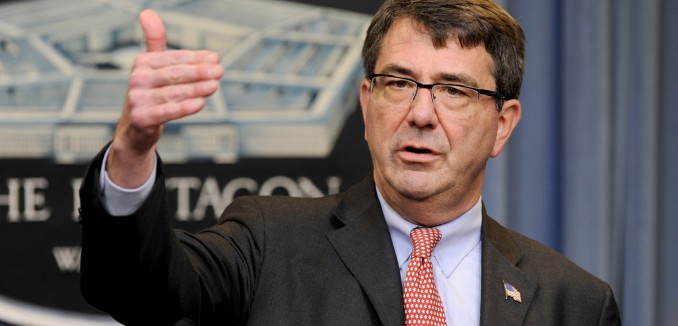President Barack Obama has selected former Pentagon official Ashton Carter to serve as his next Secretary of Defense, according to reports. Carter, who served as Deputy Secretary of Defense—the Pentagon’s second-highest position—from 2011-2013 and as Assistant Secretary of Defense under Bill Clinton, is perceived to be particularly strong on nuclear non-proliferation issues, which may have implications for how the Obama administration handles the Iranian nuclear program during the last two years of his presidency.
Politico had more analysis:
With a new deadline for Obama’s nuclear talks with Iran coming up this summer, Carter would be a critical voice as Obama weighs a military option if he can’t strike a deal with Tehran. Carter’s record suggests that he could urge a hawkish response.
A leading member of a clique of defense intellectuals long concerned with the possibility of a nuclear terrorist attack, Carter has counseled strong — even risky — action to prevent the spread of nuclear materials and know-how. In 1994, he was among Clinton administration officials who favored striking a North Korean nuclear reactor to prevent Pyongyang from developing nuclear weapons. Years later, Carter acknowledged to PBS that such a strike risked a war involving “horrific” loss of life — but added that a nuclear North Korea would be “such a disaster for our security” that it was worth taking “substantial risks” to prevent that outcome.
North Korea backed down in the moment — but eventually developed nuclear weapons, something Carter later called “a stunning defeat for the United States.”
In a 2008 paper entitled Meeting the Challenge: U.S. Policy Toward Iranian Nuclear Development, co-authored with diplomatic heavyweights such as former State Department envoy Dennis Ross and former ambassador (and current Senator) Dan Coats, Carter argued that “Iran’s nuclear development may pose the most significant strategic threat to the United States during the next Administration.”
A nuclear-ready or nuclear-armed Islamic Republic ruled by the clerical regime could threaten the Persian Gulf region and its vast energy resources, spark nuclear proliferation throughout the Middle East, inject additional volatility into global energy markets, embolden extremists in the region and destabilize states such as Saudi Arabia and others in the region, provide nuclear technology to other radical regimes and terrorists (although Iran might hesitate to share traceable nuclear technology), and seek to make good on its threats to eradicate Israel.
The commission recommended strengthening unilateral and multilateral sanctions against the Iranian regime as well as Iranian leaders and organizations, such as banks; cooperating with European and especially Russian counterparts to increase pressure on Iran; maintain a “constant dialogue with Israel” to ensure that the allies are on the same page; and making it “clear that any U.S.-Iranian talks will not be open-ended, but will be limited to a predetermined time period so that Tehran does not try to ‘run out the clock.’” The report concluded by noting that
Any agreement, however, marks not the end of the crisis, but the beginning of a sustained phase for which the United States, its allies, and international agencies must also prepare. Iranian compliance with its commitments must be verifiable, and any Iranian nuclear activity must be monitored comprehensively and in real time, not just by periodic inspections.
In a 2004 article in Foreign Affairs, Carter argued in favor of “establishing a clear U.S. strategy—diplomatic at first, but coercive if necessary—for the complete and verifiable elimination of Iran’s and North Korea’s nuclear programs.”
Carter would be the fourth person to serve as Secretary of Defense under President Obama, following Robert Gates, Leon Panetta, and Chuck Hagel, who resigned last week.
Last year, during his tenure as Deputy Defense Secretary, Carter traveled to Israel and met with senior Israeli security officials, where he “reaffirmed that the U.S.-Israeli defense relationship has never been stronger and agreed to continuing close consultations on shared security interests,” according to a Defense Department release.
The deputy secretary also met with [Israeli Defense Minister Moshe] Ya’alon, [then-] Israeli National Security Adviser Yaakov Amidror and other senior officials. Director-General of the Ministry of Defense Udi Shani hosted an official dinner for Carter…
Afterward, Carter spoke briefly to [Israeli] troops before shaking their hands and presenting them with commemorative coins from his office.
“Protecting America means protecting Israel, and that’s why we’re here in the first place,” he said. “But this is the fun part,” he added, indicating the tactical demonstration area and the fit, skilled men and women in uniform, some with their dogs and some still dressed in garb that disguised them as boulders and bushes.
Carter’s formal nomination is expected sometime in the next few days.
[Photo: Department of Defense / Wikimedia]




